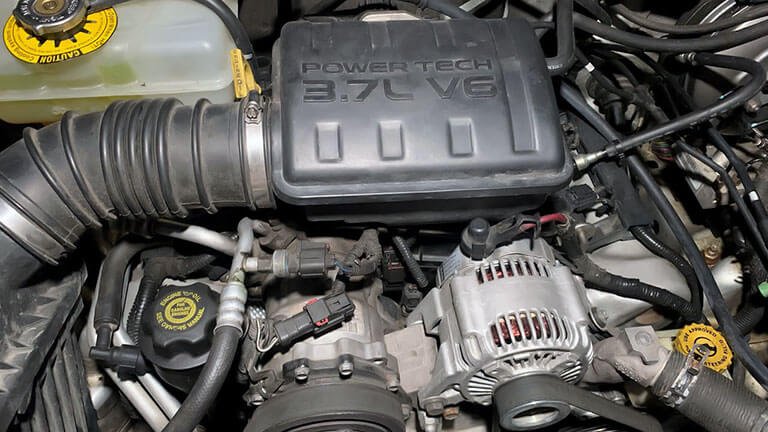Jeep 3.7 Engine Problems: Troubleshooting Tips
The Jeep 3.7 engine commonly faces issues like overheating and oil leaks. Owners often report poor fuel efficiency and engine misfires.
The Jeep 3. 7 engine, found in models like the Liberty and Commander, has gained a reputation for several persistent problems. Many drivers experience overheating, which can lead to serious damage if not addressed promptly. Oil leaks frequently occur, affecting performance and longevity.
Fuel efficiency also tends to decline, raising concerns for budget-conscious owners. Misfires can disrupt smooth driving and indicate deeper engine troubles. Understanding these issues can help Jeep owners stay proactive, ensuring their vehicles run smoothly and efficiently. Regular maintenance and timely repairs play a crucial role in mitigating these common problems.
Introduction To The Jeep 3.7 Engine

The Jeep 3.7 engine is a vital part of Jeep’s identity. Known for its ruggedness, this engine powers various popular models. Understanding its role helps in addressing common problems. Let’s dive into its significance and the models it powers.
The Role Of The 3.7l Powertech In Jeep’s Lineup
The 3.7L PowerTech engine is designed for performance. It offers a balance of power and efficiency. This V6 engine provides reliable torque for off-road adventures. It enhances Jeep’s rugged appeal while maintaining comfort on highways.
- Engine Type: V6
- Displacement: 3.7 liters
- Power Output: Approximately 210 horsepower
- Torque: Around 235 lb-ft
Common Jeep Models Featuring The 3.7 Engine
Several Jeep models feature the 3.7 engine. Here are the most common:
| Model | Years Produced |
|---|---|
| Jeep Liberty | 2002 – 2012 |
| Jeep Grand Cherokee | 2005 – 2010 |
| Jeep Commander | 2006 – 2010 |
These models showcase the engine’s versatility. They blend off-road capability with everyday usability. Many Jeep enthusiasts trust the 3.7 engine for their adventures.
Recognizing The Signs Of Engine Trouble
Knowing the signs of engine trouble can save you time and money. The Jeep 3.7 engine, while powerful, can develop issues. Early detection is key to avoiding major repairs. Look out for these signs to keep your Jeep running smoothly.
Early Symptoms Of 3.7 Engine Issues
Watch for these early symptoms of trouble:
- Strange noises: Listen for knocking or grinding sounds.
- Unusual smells: A burning smell may indicate oil leaks.
- Reduced power: Notice a lack of acceleration or power.
- Excessive smoke: Blue or black smoke may signal problems.
- Vibrations: Feel unusual vibrations while driving.
Early detection can prevent bigger issues. Regularly check for these signs to maintain your engine’s health.
Understanding Check Engine Lights And Codes
The check engine light is a vital warning system. It alerts you to potential issues. Here’s how to interpret the light:
| Light Status | Meaning |
|---|---|
| Solid Light | Minor issue detected. Check soon. |
| Blinking Light | Severe issue. Stop driving immediately. |
| No Light | No issues detected. All systems normal. |
Use an OBD-II scanner to read error codes. Each code provides specific information about the issue. Addressing problems early can prevent costly repairs.
Common Issues With The Jeep 3.7 Engine
The Jeep 3.7 engine is known for its power and durability. However, it has some common problems. Understanding these issues helps owners maintain their vehicles better. Here are two major concerns.
Valve Seat Failure And Its Impact
Valve seat failure is a significant issue. This problem can cause serious engine damage. Here are some key points:
- Valve seats wear out over time.
- This leads to poor compression.
- It can cause engine overheating.
- Replacing valve seats is costly.
Symptoms of valve seat failure include:
- Rough idling
- Loss of power
- Unusual engine noises
Problems Related To Engine Misfires
Engine misfires are another common issue. Misfires can happen for various reasons:
- Faulty spark plugs
- Bad ignition coils
- Fuel delivery problems
Signs of engine misfires include:
- Rough running engine
- Check engine light on
- Poor fuel economy
Addressing these misfires early can save money. Regular maintenance helps prevent these issues.
Cooling System Complications
The cooling system in a Jeep 3.7 engine is crucial. It keeps the engine at a safe temperature. Problems in this system can lead to serious issues. Understanding these complications helps prevent costly repairs.
Overheating: Causes And Consequences
Overheating can damage your Jeep’s engine. Several factors contribute to this issue:
- Low coolant levels
- Blocked radiator
- Faulty thermostat
- Poor airflow
Each cause can lead to severe consequences:
- Engine parts may warp.
- Oil may break down quickly.
- Major repairs may be needed.
Regular maintenance can help avoid overheating. Check coolant levels and inspect hoses often.
Radiator And Water Pump Failures
The radiator and water pump are vital for cooling. Failures in these components can lead to overheating.
| Component | Common Issues | Symptoms |
|---|---|---|
| Radiator | Leaks, clogs | Coolant puddles, engine overheating |
| Water Pump | Worn bearings, leaks | Coolant leaks, engine noise |
Regular inspections can identify these problems early. Replace any faulty components to ensure optimal performance.
Oil System And Lubrication Woes
The oil system in the Jeep 3.7 engine is vital. It ensures smooth operation and longevity. Problems in this system can lead to major issues. Understanding these challenges helps in early detection and prevention.
Oil Sludge Buildup Challenges
Oil sludge can clog passages. This reduces oil flow and cooling. Common causes include:
- Low-quality oil
- Infrequent oil changes
- Overheating
Signs of sludge buildup:
- Engine noise increases
- Decreased fuel efficiency
- Warning lights on the dashboard
Regular maintenance is crucial. Use high-quality oil and change it often.
Leaks And Their Implications On Engine Health
Oil leaks can harm the engine. They lead to low oil levels. Common leak sources include:
- Oil pan gasket
- Valve cover gasket
- Oil filter
Effects of oil leaks:
| Effect | Description |
|---|---|
| Increased friction | Leads to engine wear and tear. |
| Overheating | Insufficient oil causes overheating. |
| Engine failure | Severe leaks can result in total failure. |
Check for leaks regularly. Addressing them early saves money and time.
Electrical And Sensor-related Setbacks
The Jeep 3.7 engine faces several electrical and sensor-related issues. These problems can lead to significant performance drops. Identifying these setbacks early helps avoid costly repairs.
Throttle Position Sensor Faults
The throttle position sensor (TPS) plays a crucial role in engine performance. It measures the position of the throttle plate. Faulty TPS can cause various issues:
- Poor acceleration response
- Increased fuel consumption
- Rough idling
- Check engine light activation
Symptoms of a faulty TPS include:
- Engine stalling
- Unstable engine speed
- Difficulty shifting gears
Replacing the TPS can resolve these problems. Regular maintenance checks can prevent future issues.
Impact Of Faulty Camshaft And Crankshaft Sensors
The camshaft and crankshaft sensors are vital for engine timing. They help the engine control module (ECM) manage fuel injection and ignition timing. Faulty sensors can lead to serious performance issues:
| Sensor Type | Symptoms of Failure |
|---|---|
| Camshaft Sensor | Engine misfires, rough idle, decreased power |
| Crankshaft Sensor | Engine won’t start, stalling, poor acceleration |
Ignoring these sensor problems can lead to more severe damage. Regular checks can save time and money.
Troubleshooting Techniques For The 3.7 Engine
The Jeep 3.7 engine can face various problems. Understanding how to troubleshoot these issues can save time and money. Here are effective techniques to identify and solve common engine problems.
Diy Diagnostic Steps
Follow these simple steps to diagnose issues:
- Check the Dashboard Lights: Look for warning lights. These often indicate problems.
- Listen for Unusual Noises: Pay attention to knocking or grinding sounds. These can signal serious issues.
- Inspect Fluid Levels: Check oil, coolant, and transmission fluid. Low levels can lead to problems.
- Look for Leaks: Check under the vehicle for puddles. Fluid leaks can indicate issues.
- Use an OBD-II Scanner: This tool reads error codes. It helps find the source of the problem.
These steps can help identify common engine issues. Keep a log of what you find. This information is useful for mechanics.
When To Seek Professional Mechanic Advice
Some problems require expert help. Consider the following situations:
- Engine Warning Light: If the light stays on, seek help.
- Persistent Noises: If unusual sounds continue, consult a mechanic.
- Overheating: If the engine overheats, stop driving immediately.
- Fluid Leaks: If leaks persist, professional help is essential.
- Frequent Breakdowns: If the engine fails often, get a full inspection.
Always prioritize safety. Professional mechanics have tools and expertise to diagnose complex issues.
Preventative Maintenance To Avoid Engine Problems
Preventative maintenance is key to keeping your Jeep’s 3.7 engine running smoothly. Regular care can help prevent serious issues. Simple tasks can save you time and money.
Routine Check-ups And Their Importance
Routine check-ups are vital for your Jeep’s health. These check-ups help spot problems early. Here’s why they matter:
- Early Detection: Find issues before they become major problems.
- Cost Savings: Fixing small issues is cheaper than major repairs.
- Safety: A well-maintained engine ensures safe driving.
- Resale Value: Regular maintenance keeps your Jeep’s value high.
Best Practices For Engine Longevity
To extend your engine’s life, follow these best practices:
- Regular Oil Changes: Change oil every 3,000 to 5,000 miles.
- Check Fluid Levels: Monitor coolant, transmission, and brake fluids.
- Replace Filters: Change air and fuel filters regularly.
- Inspect Belts and Hoses: Look for cracks or wear.
- Use Quality Fuel: Choose fuel from trusted sources.
| Maintenance Task | Frequency | Benefits |
|---|---|---|
| Oil Change | Every 3,000 – 5,000 miles | Reduces engine wear |
| Fluid Checks | Monthly | Prevents overheating |
| Filter Replacement | Every 15,000 miles | Improves engine performance |
| Belts and Hoses Inspection | Every 6 months | Avoids breakdowns |
| Fuel Quality Check | Always | Enhances fuel efficiency |
Upgrading And Replacing The 3.7 Engine
The Jeep 3.7 engine has its share of problems. Many owners face issues over time. Upgrading or replacing this engine can enhance performance. Knowing when and how to do this is crucial.
When To Consider An Engine Replacement
Recognizing the right time for engine replacement is important. Look for these signs:
- Excessive Oil Consumption: Frequent oil top-ups indicate issues.
- Strange Noises: Knocking or tapping sounds can signal trouble.
- Loss of Power: A noticeable drop in power while driving.
- Engine Overheating: Persistent overheating can cause serious damage.
- Check Engine Light: Constantly illuminated light may suggest serious problems.
Options For Upgrading The 3.7 Engine
Upgrading the Jeep 3.7 engine offers various options. Here are some popular choices:
| Upgrade Option | Description | Benefits |
|---|---|---|
| Performance Chip | Enhances engine tuning and efficiency. | Increased horsepower and better fuel economy. |
| Cold Air Intake | Improves airflow to the engine. | Boosts power and throttle response. |
| Aftermarket Exhaust | Reduces backpressure and improves exhaust flow. | Enhances sound and performance. |
| Complete Engine Swap | Replacing the 3.7 engine with a more powerful option. | Significantly increases power and reliability. |
Consider these upgrades based on your needs. Each option has unique benefits. Always consult a mechanic before making changes. Proper installation ensures the best results.
Case Studies: Real-world Engine Troubles And Solutions
The Jeep 3.7 engine has faced various issues. Understanding these problems can help owners. Let’s explore some real-world cases and their solutions.
Common Scenarios And Fixes
Many Jeep 3.7 owners reported similar engine problems. Here are the most common scenarios:
- Overheating: Caused by a faulty thermostat.
- Oil leaks: Often due to worn gaskets.
- Poor performance: Linked to a dirty fuel filter.
- Check Engine light: May signal various issues.
Here are some fixes for these problems:
- Replace the thermostat to solve overheating.
- Inspect and replace gaskets for oil leaks.
- Clean or replace the fuel filter for better performance.
- Run a diagnostic to find the cause of the check engine light.
Learning From Others’ Experiences
Many Jeep owners have shared their experiences online. Here are a few notable case studies:
| Owner | Problem | Solution |
|---|---|---|
| John D. | Overheating during long drives | Replaced the radiator and thermostat |
| Mary S. | Oil leak under the engine | Replaced the oil pan gasket |
| Tom R. | Engine stalling frequently | Changed the spark plugs and wires |
These case studies highlight common issues and effective solutions. Learning from others helps prevent future problems.
Conclusion: Ensuring Your Jeep’s Reliability
Maintaining the reliability of your Jeep with a 3.7 engine is crucial. Regular checks can help you avoid major issues. Understanding common problems allows for better care.
Summarizing Key Takeaways
- Oil leaks can lead to serious engine damage.
- Overheating often results from a faulty thermostat.
- Timing chain failures can affect engine performance.
- Regular maintenance can prevent most issues.
- Seek professional help for complex repairs.
The Future Of The Jeep 3.7 Engine
The Jeep 3.7 engine has a mixed reputation. Many owners report issues, but others enjoy reliability. Regular maintenance can improve your experience.
With proper care, your Jeep can last longer. Here are some tips for future reliability:
- Check oil levels monthly.
- Replace the coolant regularly.
- Inspect the timing chain every 60,000 miles.
- Monitor for any unusual noises.
- Schedule regular professional inspections.
Your Jeep deserves attention. Keeping up with maintenance ensures a dependable ride.
Frequently Asked Questions
What Are Common Jeep 3.7 Engine Issues?
Common issues include overheating, oil leaks, and faulty spark plugs, which can lead to poor performance and efficiency.
How Can I Fix Jeep 3.7 Engine Problems?
Regular maintenance, timely oil changes, and replacing worn parts can help resolve many engine issues effectively.
What Causes Jeep 3.7 Engine Overheating?
Overheating can be caused by coolant leaks, a faulty thermostat, or a malfunctioning water pump affecting engine temperature control.
How To Identify Jeep 3.7 Engine Oil Leaks?
Look for oil spots under the vehicle, check oil levels frequently, and inspect gaskets and seals for wear.
Is The Jeep 3.7 Engine Reliable?
The Jeep 3. 7 engine has a mixed reputation; while some owners report reliability, others face persistent issues requiring attention.
Conclusion
Understanding the common issues with the Jeep 3. 7 engine can save you time and money. Regular maintenance is key to preventing major problems. If you experience any signs of trouble, address them promptly. A well-cared-for engine not only enhances performance but also ensures longevity.
Stay informed and keep your Jeep running smoothly.






